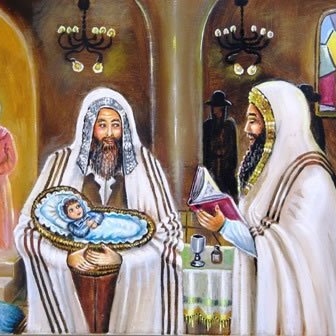
News

Regulatory body improves oversight of Brit Milot
NICOLA MILTZ
The board was established in 2016 by Chief Rabbi Dr Warren Goldstein, following a botched Brit Milah in 2014 that shocked and scared the community. Now, the board is responsible for ensuring the highest standards of care and safety for all infants undergoing a Brit Milah.
According to the report, 174 Britot were performed in 2016, and 162 were performed in 2017. Of the 336 performed, reported complications occurred in three cases (0.9% of total Britot performed).
Dr Richard Friedland, the Chairperson of the board, told the SA Jewish Report this week that with the exception of one case, these were all “considered minor and resolved with no complication or need for hospitalisation”.
“In the one case, which occurred a few hours after the Brit Milah, the mohel was unfortunately on an airplane and not able to attend to the child. The child was taken to a hospital for bleeding that was resolved with stitches applied to the skin, with no further complications.”
The mohel had apparently performed the bris in Cape Town in the morning, and flew back to Johannesburg in the afternoon after checking on the baby and speaking to the family.
The report reveals that a total of five complaints were received and investigated over the period under review (1.5% of total Britot performed).
One of these complaints related to a Brit Milah conducted prior to the establishment of the regulatory board, said Friedland.
All complaints are confidential, he said, crucial for encouraging parents to feel free to lodge them in the first place. The complaints included issues related to communication skills, lack of appropriate information regarding the procedure, and concerns about the surgical technique employed in Brit Milah.
“All of the complaints were promptly and thoroughly investigated to the satisfaction of all parties involved. Valuable learnings were gleaned, which have been included in the standardised policies and procedure guidelines,” Friedland said. For example, in cases such as the one where the mohel was on an aeroplane, there will be a back-up contingency plan in future.
Several queries were also received, he said, “mainly seeking further information or clarification, which were attended to satisfactorily”.
During 2018, upgrades were implemented, allowing digital submission of all forms, documents, and medical notes. Over the course of the year, the mohalim have migrated to the new system, according to the report.
In this period, the board established standardised guidelines, protocols, and procedures governing Brit Milah in South Africa; created a fully digitised record system for mohalim; and a website for the public.
“The digitised record system, which allows for accurate and detailed retention of all information related to Britot, is the first of its kind in the world,” said Friedland.
The board has conducted three learning and development workshops with international experts, and has implemented a comprehensive accreditation system for all mohalim. This accreditation, according to Friedland, is “far more rigorous than elsewhere in the world”.
Mohalim are required to provide a South African police clearance certificate confirming no criminal record; a certificate from the department of social development confirming that their name is not on the National Child Protection Register; Proof of Hepatitis B immunisation and demonstration of immunity to Hepatitis B; a certificate confirming negative HIV status; a letter from a general practitioner stating that the mohel is medically fit; a letter from an optometrist or relevant medical professional that the mohel is visually fit to perform Brit Milah; and proof that the mohel is fully qualified, in terms of Jewish Law, to practice as a mohel.
Mohalim are also required to attend an annual workshop/continuing education session.
The following mohalim have attained full accreditation: Rabbi Anthony Gerson, Rabbi Matthew Liebenberg, Dr Dean Gersun, Rabbi Micha Kaplan, and Dr Moshe Singer.
Rabbi Desmond Maizels and Rabbi Baruch Rubanowitz are in the process of finalising their accreditation. Rabbi Ruben Suiza has retired from performing Britot.
According to Rabbi Anton Klein, the Beth Din representative on the Regulatory Board, any queries received on the website “are responded to within 24 hours”.
- To read the full report, go to the website www.britmilahsa.co.za




